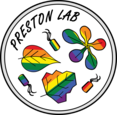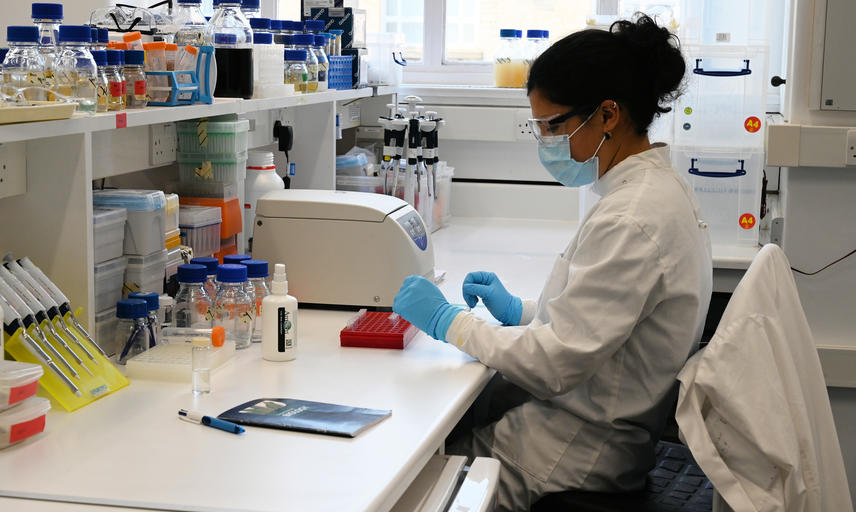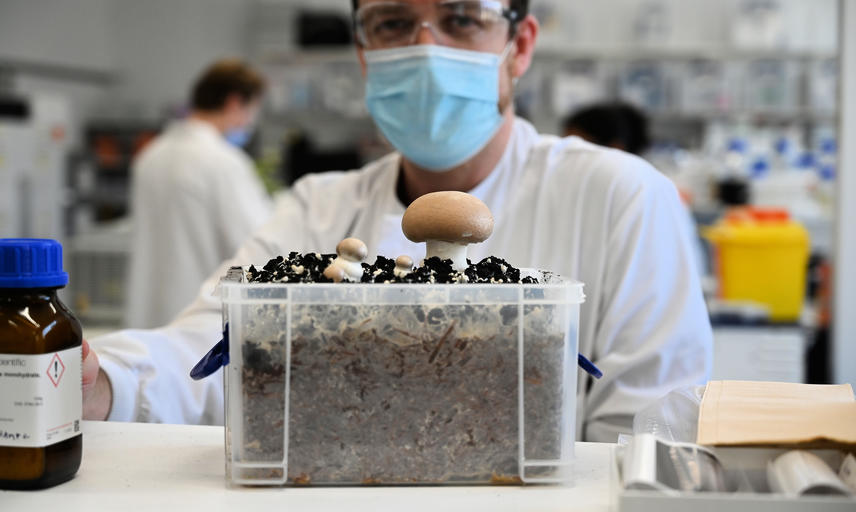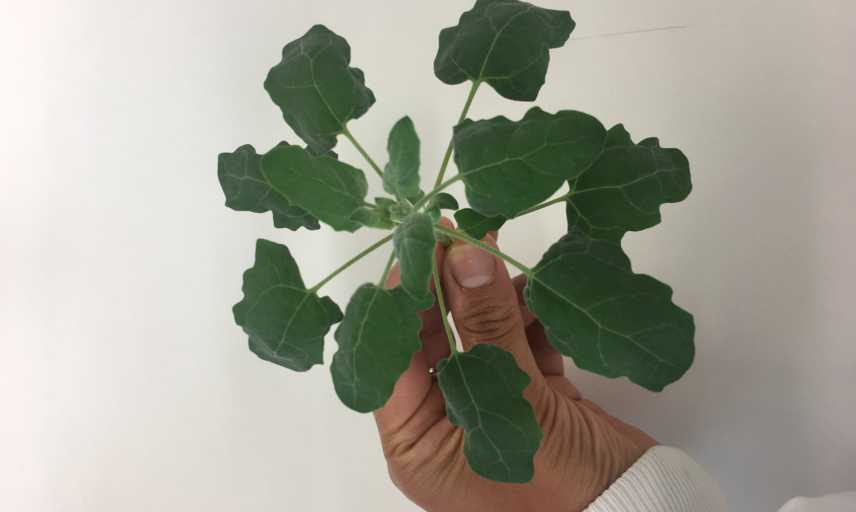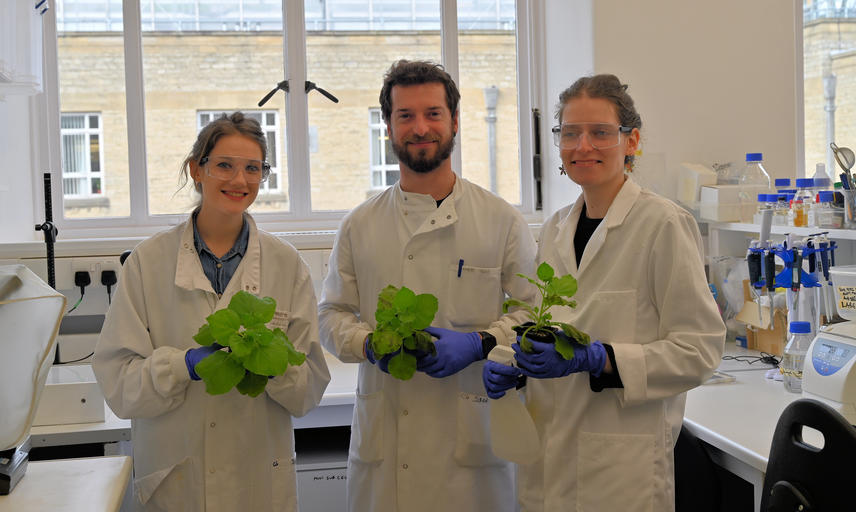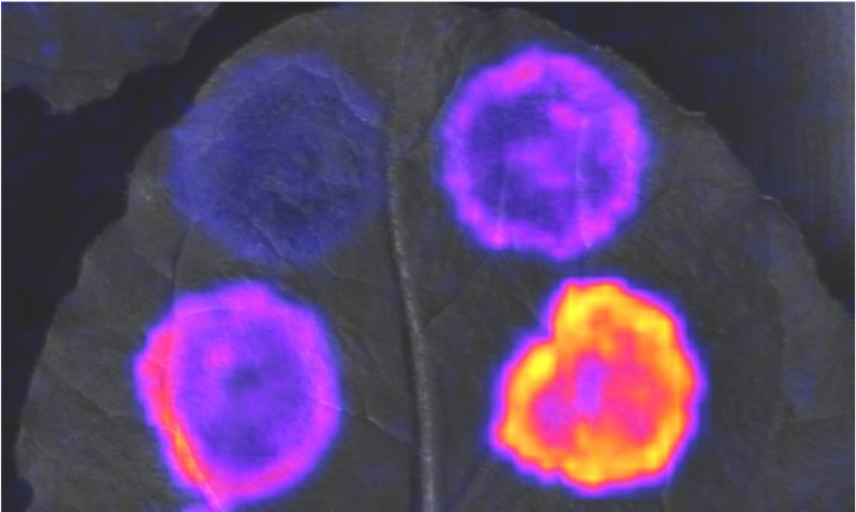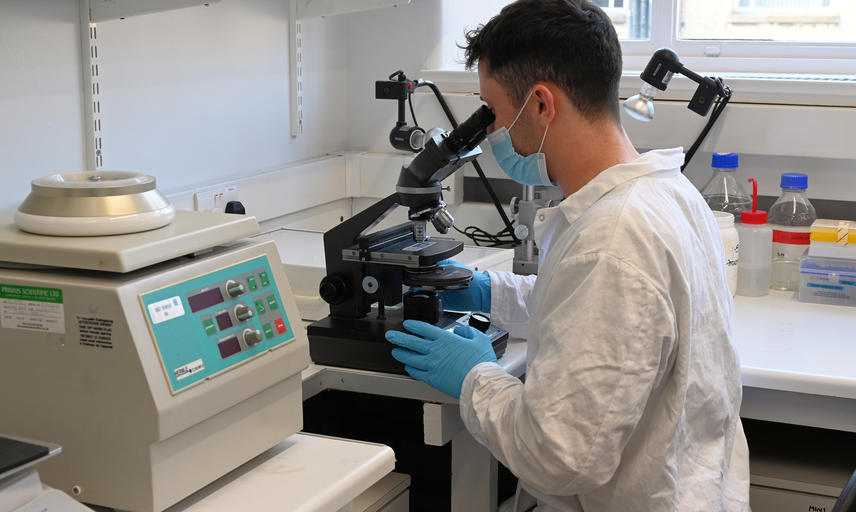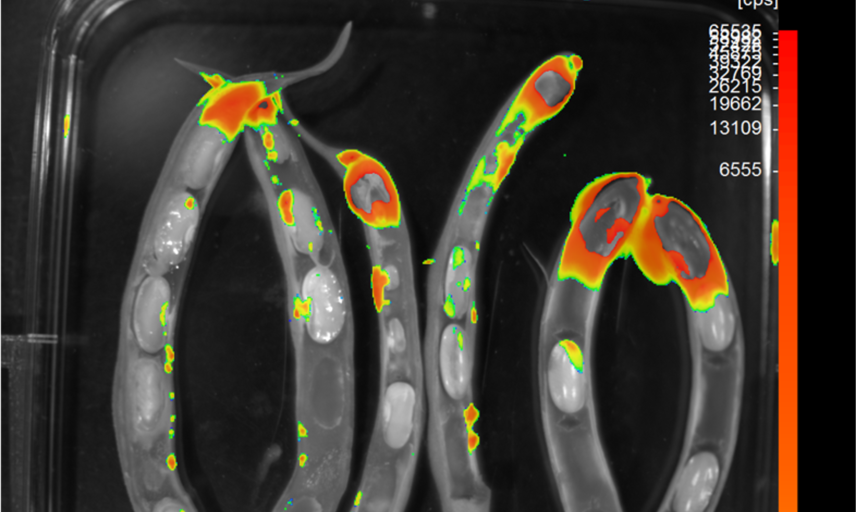Welcome to The Preston Lab
Welcome to the Preston Lab!
Our research focuses on plant-microbe and microbe-microbe interactions, with a particular emphasis on diseases of plants and mushrooms.
We aim to understand how the microenvironment inside host organisms affects disease development and how external environmental factors can alter the balance between disease resistance and susceptibility.
We are interested in how the metabolic and regulatory networks of plants and plant-associated microorganisms determine the outcome of plant-microbe interactions, and how knowledge of host-microbe interactions can be exploited for biotechnological applications and disease control.
Our interdisciplinary research programme uses a wide variety of techniques ranging from microbiology, metabolomics and molecular genetics to imaging and bioinformatics.
Major funders of our work include
UKRI-BBSRC (Biotechnology and Biological Sciences Research Council), the John Fell Fund and the European Union's Horizon 2020 research and innovation programme, which is currently supporting EU funded project BIOSCHAMP (link: https://bioschamp.eu/) under Grant Agreement No. 101000651.
News
January 2024
New publication: Consistent effects of independent domestication events on the plant microbiota: Current Biology (cell.com)
We are excited to report that Riccardo Soldan's doctoral work on the effects of domestication on the microbiota of Phaseolus seeds has been published in Current Biology. Thanks to all of those who contributed to this work, including Marco Fusi, Massimiliano Cardinale, Luis Guillermo Santos, Peter Wenzl, Elena Bitocchi, Maria Isabel Chacon Sanchez, Daniele Daffonchio and former group members Marcel Bach-Pages and Felix Homma.
December 2023
Congratulations to Flo for successfully completing her DPhil viva. She's done ground-breaking work and been an amazing ambassador for quinoa, Bolivia, EEDI and Women in Sport. Many thanks to Karl Schmid and Elena Baena-Gonzalez for acting as examiners.
November 2023
Improving the experience of disabled students in STEM
A important report on the lived experience of disabled doctoral students that Gail commissioned and collaborated on, in her capacity as Interdisciplinary Bioscience DTP Director, together with Pete Quinn Consulting Ltd. and Disabled Students UK and with the support of funding from BBSRC, is now publicly available. The report has been widely discussed, including articles in THE, WonkHE and Chemistry World. You can access the report here https://disabledstudents.co.uk/research/phd-report/.
Applying for Postgraduate Study in Plant Health in the UK
Gail led a BSPP session on applying for postgraduate study in plant health in the UK, with Morgan providing a student perspective.
October 2023
Welcome to Sarah!
We are delighted to welcome Sarah Skinner to the group, who will be undertaking her MBiol project with us - working closely with Brett on the role of RNA binding proteins in plant immunity.
Sept 2023
Rose takes home the best poster prize at MBPP!
The group was well-represented at the Molecular Biology of Plant Pathogens meeting and the British Society of Plant Pathology's annual conference in Birmingham. Rose did the group proud by winning the best poster prize for her outstanding poster, and presenting her work in a talk as part of the PH Gregory Competition. Gail also introduced MBPP attendees to the links between plant pathology and beer foam - and provided an opportunity for delegates to sample both stout and quinoa vodka in her alcohol-themed talk.
July 2023
Group Members attending IS-MPMI
Tee, Morgan and Brett will be presenting their research at IS-MPMI in Providence. If you get the opportunity do go and check their posters out!
Congratulations Julianna!
Congratulations to Julianna, who successfully defended her DPhil thesis on "Investigating the effects of temperature on bacterial pathogens of common bean". Thanks very much to Dawn Arnold and Craig MacLean for being the examiners. Many thanks are also due to co-supervisor Leighton Pritchard for all his support.
June 2023
Welcome Anna!
We are delighted to welcome Anna Li to the group for a BSPP-funded summer internship. Anna will be working with Rose on the role of metal hyperaccumulation in disease resistance in Noccaea.
April 2023
Presentation by Brett at the Seed Plant SIG
Brett presented exciting recent developments in his research on "Investigating the RNA-binding dynamics of AtGRP7 during PAMP-triggered immunity" at the Genetics Society Seed Plant Special Interest Group meeting in Durham.
February 2023
Welcome Carolline!
We are delighted to welcome Carolline Fazolato from the Federal University of Rio de Janeiro in Rio de Janeiro, Brazil, who is joining us in 2023 as a visiting researcher to study bacterial colonisation of quinoa and related plants.
January 2023
MPLS Outstanding Research Supervision Award
Gail was honoured to be awarded one of the inaugural MPLS Awards for Outstanding Research Supervision.
Exploring the potential of Chenopods as under-utilised crops for the UK
Thank you to everyone who joined us for a fascinating discussion of the potential of chenopods such as quinoa and its relatives as under-utilised crops for the UK. Special thanks to Ben Gibbons, Head Chef at St. Anne's College for preparing a truly wonderful chenopod tasting menu for us.
Building links between Oxford and Bolivia
We are excited to be hosting Ing. Nancy Huanca Alanoca, the head of genetic resources of Bolivia's National Germplasm Bank INIAF and Ing. Edwin Marcelo Gonzales Torrico, agronomic engineer and lecturer at the Technical Univeristy of Oruro (UTO) for a research visit as part of our ongoing work on quinoa and related crop plants.
Welcome Athira!
We're delighted to be hosting Athira Menon for her DTP rotation project - working with Rose Bourdon on bacterial colonisation of metal hyperaccumulating plants.
December 2022
We're recruiting!
We are currently recruiting a postdoctoral research associate to work on a joint project with Paul Jarvis' group looking at how bacterial pathogens manipulate chloroplastic processes during infection. For further details see: https://www.biology.ox.ac.uk/vacancies. The deadline for applications is January 9th 2023.
October 2022
Welcome Betty!
We are delighted to welcome to the group Betty Lung, who is working on her MBiol project in collaboration with our group and Renier van der Hoorn's research group.
September 2022
Welcome Carolin!
We are delighted to welcome Carolin Artmann from the University of Bielefeld, who will be joining us as an intern from September 2022 - February 2022.
BSPP Presidential Meeting
Gail gave a talk on Riccardo Soldan's work on "Domestication of the seed microbiome" at the BSPP Presidential Meeting in Newcastle.
July 2022
Welcome Chloe!
This month we've been delighted to welcome Chloe Harper to the group to undertake a summer research project on regulation of virulence gene expression in Pseudomonas syringae, supported by a Harry Smith Vacation Studentship from the Microbiology Society.
BBSRC iCURE
Flo will be spending the summer working with the BBSRC iCURE programme to further develop the translational potential of work arising from her DPhil work.
June 2022
Mentoring inexperienced researchers
On June 21st, Gail, David Studholme and Katia Hougaard will lead a Plant Health Club workshop that will provide advice for researchers who are involved in mentoring inexperienced researchers, including early career researchers who are mentoring students funded by BSPP undergraduate vacation bursaries.
Prize-winning public engagement
Congratulations to Julianna for winning the Oxford Interdisciplinary Bioscience DTP's public engagement award at the DTP's annual symposium and impact awards!
Pleiotropic constraints promote the evolution of cooperation in cellular groups
New paper in PLoS Biology by alumnus Michael Bentley with collaborators Kevin Foster, Jotun Hein and Kit Yates examines how linking cooperative and private traits can help maintain cooperation within groups of cells or organisms.
May 2022
Approaching the domesticated plant holobiont from a community evolution perspective - new perspective article by Riccardo with Marco Fusi and Gail discussing how researchers can use community evolution concepts to view domesticated plants as holobionts with quantifiable community heritability.
How bacteria overcome flagellin pattern recognition in plants - new review article focusing on recent breakthroughs by Tee, Pierre and Gail in Current Opinion in Plant Biology.
Ashleigh presented her work on "Ozone-mediated control of food spoilage & food-borne pathogens" at the 3rd Plant Microbiome Symposium in Dundee.
BSPP Plant Health Club - Biosecurity
On May 10th Gail chaired a BSPP Plant Health Club session with a talk by Anna Platoni (RHS) on biosecurity at Chelsea Flower Show and other major plant-focused events.
March 2022
Congratulations to Riccardo!
On March 25th Riccardo successfully defended his doctoral thesis on "The effect of plant domestication on the seed microbiome". Thank you to Kevin Foster and Vittorio Venturi for acting as examiners.
BSPP Plant Health Club: Applying For and Securing Research Fellowships
On March 15th Gail chaired a BSPP Plant Health Club session that provided insight into the process of applying for research fellowships.
November 2021
Postgraduate Opportunities in Plant Health in the UK
On November 17th Gail will be hosting a virtual event focused on supporting students to apply for postgraduate (masters and doctoral) study in Plant Health. Click here to register and find out more.
BSPP Plant Health Club: Siân Deller and Adrian Fox
On November 9th Gail and Ana Wood (Syngenta) will be hosting a Living Science session of Plant Health Club at which Siân Deller (Syngenta) and Adrian Fox (Fera) will discuss their careers and experiences in plant pathology, Click here to register.
October 2021
British Society for Plant Pathology LGBTQIA+ Networking Event
On October 28th Gail and Basti Samwald (PhD student at the John Innes Centre) moderated a virtual BSPP networking event for society members who identify as LGBTQIA+. Information on the event is available here.
Welcome Tom!
We are delighted to be joined by Oxford Biology student Tom Barnes who will be working on his 4th year MPhil project with Will Kay and Jaime Carrasco, studying the biocontrol activity of mushroom-associated bacteria.
Entrepreneurship In Science
On October 5th Lauren co-chaired a BSPP Plant Health Club event focused on Entrepreneurship in Science, featuring Ale Maiano.
September 2021
Welcome Brett!
We are excited to welcome new Interdisciplinary Bioscience DTP student Brett Wadley to our group. Brett will be working with us and Maddy Seale to apply cutting edge approaches to investigate how the biophysical properties of the cell wall are modified during plant-pathogen interactions.
August 2021
AgroLux: bioluminescent Agrobacteria to improve molecular pharming and study plant immunity
We are pleased to announce the publication of a joint paper with Renier van der Hoorn's Plant Chemetics lab in The Plant Journal on the development of bioluminescent Agrobacteria ("AgroLux") to monitor the abundance and physiological state of Agrobacterium in planta. We show that luminescence can be correlated with protein expression following agroinfiltration and is suppressed by the induction of plant immune responses, providing a rapid assay for improving molecular pharming or studying the effect of transiently expressed proteins on plant immunity.
Crop domestication and host control of the microbiota
Our latest publication by Riccardo Soldan together with our collaborators Marco Fusi, Massimiliano Cardinale and Daniele Daffonchio is out in Communications Biology! In it we present an evolutionary framework for understanding how and why host control of the microbiota has changed during crop domestication and discuss the potential impact of domestication syndrome on the seed microbiome.
July 2021
UNIQ+ 2021
This month we are delighted to welcome Chloe Harper and Jasmine Dodds who are joining us for six weeks as part of the UNIQ+ internship programme. Chloe and Jasmine will be using bioinformatics approaches to identify candidate virulence factors and stress tolerance genes in Pseudomonas syringae strains that are capable of infecting Chenopodium quinoa and Noccaea caerulescens.
June 2021
Welcome Megan!
We are delighted to welcome Megan Beattie to Oxford to undertake a 10 week project funded by the Plant Health Summer Studentship programme, coordinated by the Royal Society of Biology. Megan will be studying whether bioluminescent and fluorescent reporter constructs can be used to monitor infection and viability in seed-borne bacterial pathogens. Megan's project is funded by the David Colegrave Foundation, which supports the development of students studying horticulture in the UK and Ireland.
Dutch Elm Disease exhibit now open at the Harcourt Arboretum! An exhibit on Dutch Elm Disease and its impact that has been developed and designed by Julianna Piat during her Interdisciplinary Bioscience DTP internship, and supported by the British Society for Plant Pathology, has opened at Harcourt Arboretum. In addition to providing insight into this important tree disease the exhibit also includes specific information on how Dutch Elm Disease affected Oxford. Julianna worked with botanical illustrator Rosemary Wise to commission artwork showing the Dutch Elm Disease lifecycle, and worked hard to ensure the exhibit is as accessible and inclusive as possible, including working with audio-describer Roz Chalmers to create an audio description. You can learn more about Dutch Elm Disease, listen to the audio description and find details of the exhibit here.
Visualising how plants and microbes function in sign language. In September 2020 we hosted a webinar by Audrey Cameron, Rachel O’Neill and Gary Quinn from the Scottish Sensory Centre, with the support of the British Society of Plant Pathology, who explained the process of developing new signs to represent scientific concepts and terms in British Science Language (BSL). You can watch the recorded webinar here.
For more lab news click here, and follow us on twitter for regular updates and information

